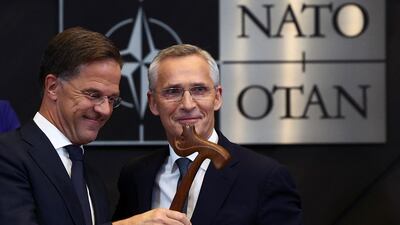Former Dutch prime minister Mark Rutte took over as Nato secretary general on Tuesday, succeeding the long-serving Jens Stoltenberg, as the military alliance confronts some of its biggest challenges.
Mr Stoltenberg handed Mr Rutte a ceremonial wooden Viking gavel donated in 1963 by Iceland before inviting him to sit in the head seat in the North Atlantic council room.
“It is a big job, and I have big shoes to fill,” said Mr Rutte after the two men shook hands. The gavel, which resembles a hammer, is a symbol of Iceland's ancient parliamentary tradition and has been used for special Nato meetings.
Mr Rutte said he would ensure continuity on Mr Stoltenberg's priorities, which include supporting Ukraine as the country enters its third winter at war with Russia, as well as boosting collective defence.
“I cannot wait to get to work,” Mr Rutte said during a joint press statement with his predecessor, who he thanked for keeping Nato on course “during turbulent times”.
“We have to make sure that Ukraine prevails as a sovereign democratic nation,” added Mr Rutte. “We need to do more in terms of our collective defence and deterrence. We need to invest more and close the capability gaps.”
The Kremlin reacted to Mr Rutte's takeover of Nato by saying they expected more of the same.
“At one time, there were hopes for the possibility of building good pragmatic relations – at least, such a dialogue was conducted – but subsequently we know that the Netherlands took a rather irreconcilable position, a position on the complete exclusion of any contacts with our country,” said spokesman Dmitry Peskov.
In his first press conference in his new job, Mr Rutte dismissed the Kremlin's jab at his country, saying that Moscow “has excellent sources and I couldn't have said it in a better way … because I'm very much an admirer of Jens Stoltenberg.”
“Personal experience” steering his country through the 2014 downing by Ukrainian separatists of flight MH17, in which more than two-thirds of passengers were Dutch, taught Mr Rutte that war in Ukraine “is not contained to the front line”, he said.
Mr Rutte also said there were no “imminent threat” of Vladimir Putin using nuclear weapons despite recent statements by the Russian president. “Generally, if we were to give into Putin's threats, we would set a precedent that using military force allows a country to get what it wants, and we can't do that,” he said.
'Mixed feelings'
Mr Rutte and Mr Stoltenberg, a former prime minister of Norway who became secretary general in 2014, began the day by laying wreaths at a monument at Nato headquarters in Brussels in memory of the men and women who have died fighting under the alliance's banner.
“I have to admit that I am leaving the alliance with mixed feelings,” Mr Stoltenberg said. “It's difficult to leave an alliance and an organisation that I've served for 10 years.”
But he added that he left the role feeling pride at having overseen the biggest reinforcement of Nato's collective defence in a generation and the integration of four new members – North Macedonia, Montenegro, Finland and Sweden.
Mr Stoltenberg had also relentlessly pushed allies to increase their defence spending. When he started the job, only three countries spent 2 per cent of GDP on defence. That figure is now at 23 out of 32.
Mr Rutte said he was “not worried” about the prospect of Donald Trump returning as US president following elections in November, a possibility that has caused concern in Europe after he asked allies to “pay up” to secure their defence by the US in case of an attack.
As Dutch prime minister, Mr Rutte was seen as successfully navigating a working relationship with Mr Trump. Mr Rutte also said he knew Kamala Harris well, Mr Trump's democratic opponent. “I'll be able to work with both, whatever the outcome of the election is,” said Mr Rutte.
Mr Rutte and Mr Stoltenberg's teams have been working together for three months to prepare the highly choreographed handover. Mr Rutte, who had no serious contender running against him, got the job after his government in the Netherlands collapsed last year.
During his 14-year tenure as prime minister, Mr Rutte headed four different coalition governments, which made him a particularly good candidate to head Nato, according to Mr Stoltenberg. “He knows how to make compromises, create consensus, and these are skills which are very much valued here at Nato,” he said.
Asked why he wanted to become Nato's new secretary general, Mr Rutte said the circumstances were right. “I had to say no previously to an American president because I was still in office and that would have led to new elections in the Netherlands,” he said. “But then the government collapsed. I thought of it deeply during the summer and then decided in September-October, given the whole situation now, that I would give it a try. And then, of course, I had to work to convince all allies.”
The two men were questioned about Israel's recent bombing campaign and ground invasion of Lebanon, which Israel has described as “targeted and precise”. Nato is “deeply concerned” about the situation, Mr Stoltenberg said. “We support the efforts of Nato allies to find a way to de-escalate and find a political solution both through the ongoing hostilities in Gaza but also the situation in Lebanon,” he told reporters.
“There is a clear worry here,” said Mr Rutte, who also highlighted that the alliance “has no specific role” in the war. “We are of course as an alliance in constant contact with all our partners over there and of course we hope that the hostilities will end as soon as possible,” added Mr Rutte.


